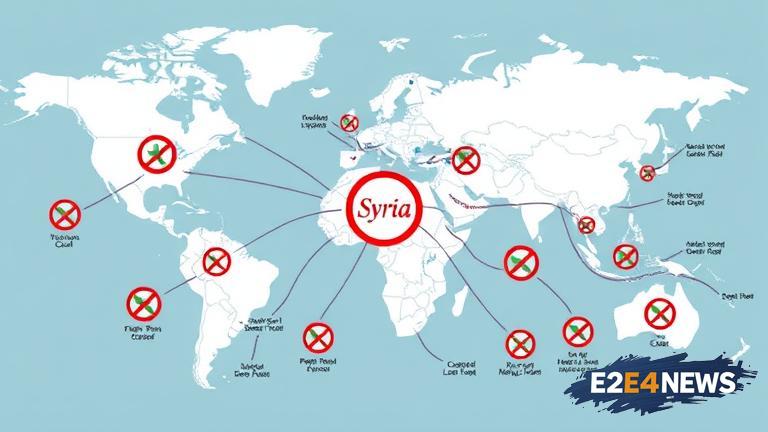The Syrian civil war has been ongoing for over a decade, resulting in one of the most severe humanitarian crises of our time. The international community has responded with a range of measures, including economic sanctions, aimed at pressuring the Assad regime to end the conflict. The US and EU have been at the forefront of these efforts, imposing sanctions on key figures and entities within the Syrian government. The sanctions have targeted the regime’s ability to access international finance, trade, and other economic resources. However, the effectiveness of these sanctions has been debated, with some arguing that they have had little impact on the regime’s behavior. Others have pointed out that the sanctions have had unintended consequences, such as exacerbating the humanitarian crisis and strengthening the regime’s grip on power. The US has imposed sanctions under the Syria Accountability and Lebanese Sovereignty Restoration Act, as well as the Caesar Syria Civilian Protection Act. The EU has also imposed its own set of sanctions, targeting the regime’s military and security apparatus. The sanctions have been regularly updated and expanded, with new designations and restrictions added over time. Despite these efforts, the conflict in Syria continues to rage on, with the regime maintaining its grip on power. The humanitarian crisis has only deepened, with millions of civilians displaced and in need of aid. The international community has struggled to find a solution to the crisis, with diplomatic efforts stalled and a lasting peace agreement elusive. The sanctions have also had a significant impact on the Syrian economy, with the country’s GDP shrinking by over 50% since the start of the conflict. The regime has responded to the sanctions by turning to other sources of support, including Iran and Russia. The US and EU have also faced criticism for their role in the conflict, with some arguing that their policies have only served to exacerbate the crisis. As the conflict continues to unfold, it remains to be seen whether the sanctions will ultimately achieve their intended goal of pressuring the regime to end the conflict. The international community must continue to work towards a lasting solution, one that addresses the root causes of the conflict and provides a path forward for the Syrian people. The sanctions are just one part of a broader strategy, and must be combined with diplomatic efforts and humanitarian support to achieve a lasting peace. The US and EU must also work to address the unintended consequences of the sanctions, and ensure that they are not harming the very people they are intended to help. Ultimately, the situation in Syria remains complex and multifaceted, requiring a comprehensive and nuanced approach to resolve. The sanctions are just one tool in the toolbox, and must be used in conjunction with other measures to achieve a lasting peace. The international community must remain committed to finding a solution to the crisis, and must work together to support the Syrian people in their time of need.
